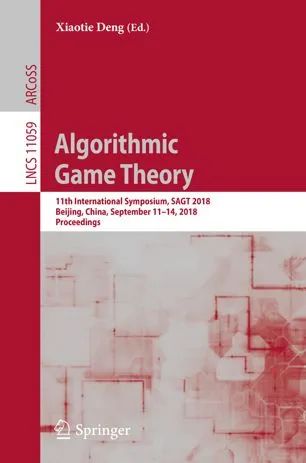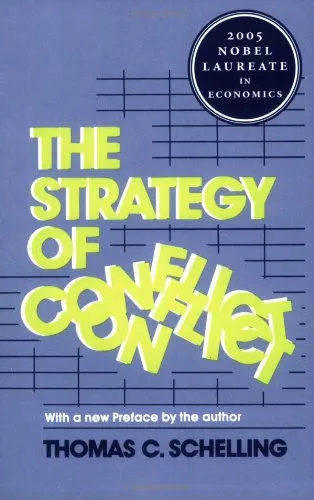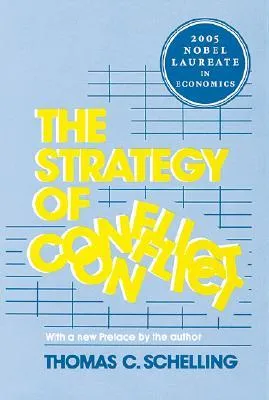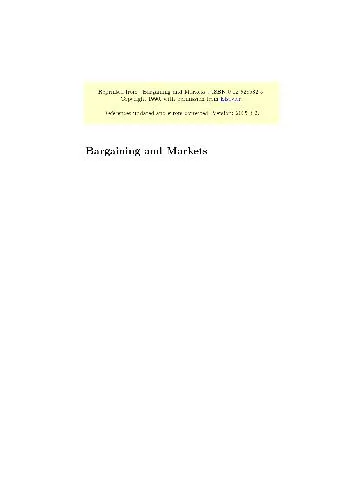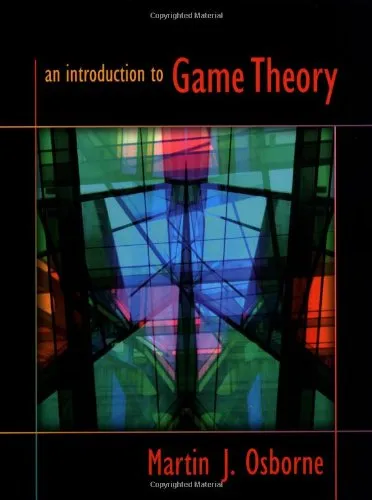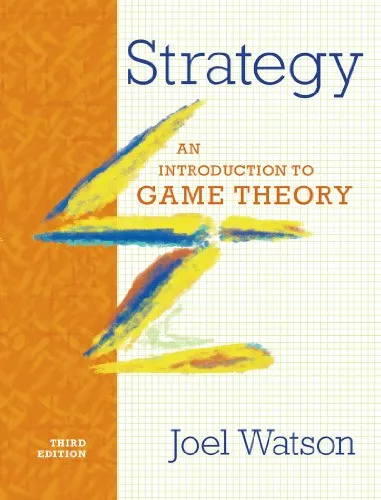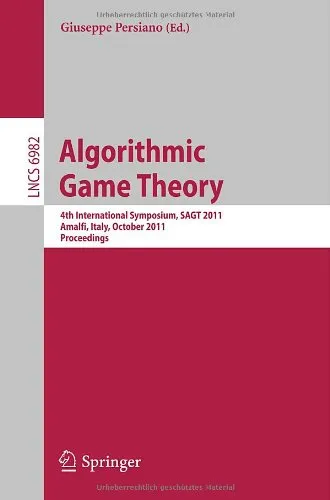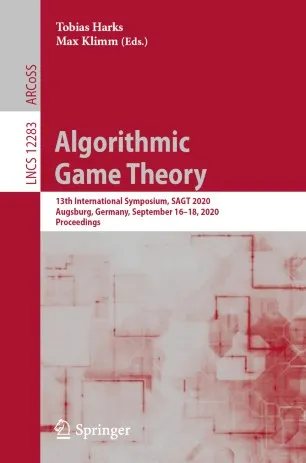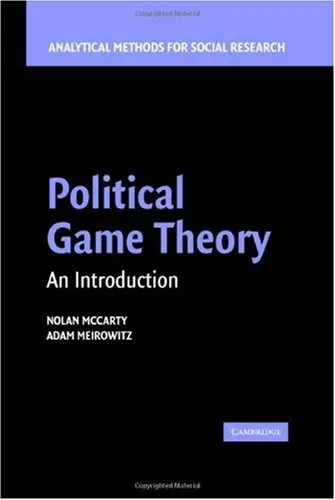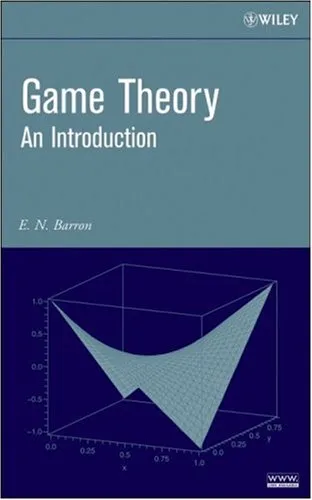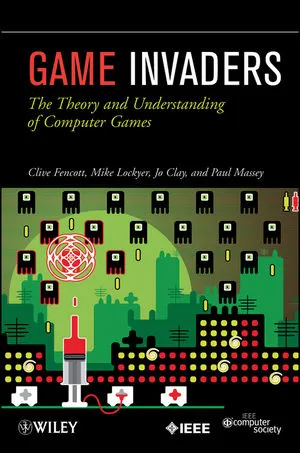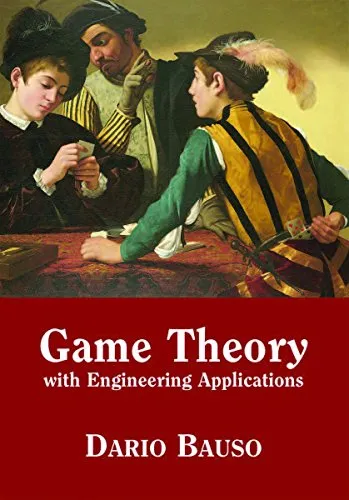Algorithmic Game Theory: 11th International Symposium, SAGT 2018, Beijing, China, September 11-14, 2018, Proceedings
4.5
Reviews from our users

You Can Ask your questions from this book's AI after Login
Each download or ask from book AI costs 2 points. To earn more free points, please visit the Points Guide Page and complete some valuable actions.Related Refrences:
Introduction to 'Algorithmic Game Theory: 11th International Symposium, SAGT 2018'
'Algorithmic Game Theory: 11th International Symposium, SAGT 2018, Beijing, China, September 11-14, 2018, Proceedings' is a seminal book that brings together an extensive array of cutting-edge research in the field of algorithmic game theory. The book captures the advancements, theoretical underpinnings, and practical applications of algorithmic game theory as discussed and presented at the 11th International Symposium on Algorithmic Game Theory (SAGT 2018). This prestigious event, held in Beijing, China, acted as a global forum for researchers, practitioners, and theoreticians to exchange ideas and develop new insights into the fascinating intersection of algorithms and game theory.
With an extensive focus on optimization, algorithm design, and strategic behavior in decentralized systems, this book is a critical resource for anyone seeking a deeper understanding of this multidisciplinary field. Edited by top scholars and backed by robust peer-reviewed content, it presents rigorously selected papers that span a variety of topics, ranging from economic insights into algorithms to mathematical modeling of competitive behaviors in networked systems.
Detailed Summary of the Book
The book is organized around the key topics presented during the SAGT 2018 symposium, addressing both the foundational aspects of algorithmic game theory and emerging areas of research. It covers a wide spectrum of material, including computational complexity in strategic settings, mechanism design, learning dynamics, aggregative games, and network economics. Each chapter is based on innovative, peer-reviewed research that advances both theoretical and applied perspectives of algorithmic game theory.
Major areas of focus include:
- Advanced analysis of Nash equilibrium and its complexity in large-scale and real-world applications.
- In-depth exploration of mechanism design with incomplete information, emphasizing incentive compatibility and fairness.
- Algorithms governing decentralized settings, such as online platforms, auctions, and distributed resource optimization.
- New perspectives on learning dynamics in multi-agent systems and their implications for artificial intelligence.
Throughout its chapters, the book bridges theoretical constructs with practical implications, offering insights into how algorithmic techniques can solve real-world problems involving strategic agents. It highlights the cross-disciplinary nature of the field, which touches on computer science, economics, mathematics, and operations research.
Key Takeaways
The book delivers a plethora of insights that are invaluable for researchers, students, and practitioners alike. Here are some of the key takeaways:
- Understanding the computational complexity of equilibria in various game-theoretical settings and their implications for real-world systems.
- Insights into innovative design mechanisms that maintain efficiency, trust, and fairness in decentralized systems.
- A comprehensive overview of emerging trends in blockchain, auction design, and learning algorithms for game-theoretical applications.
- New paradigms for analyzing interactions among autonomous agents, including their convergence rates and long-term stability.
- The interplay between theoretical foundations and practical applications of game-theoretical problems in industries such as finance, telecommunications, and e-commerce.
These takeaways make the book not only an academic reference but also a guide for algorithm designers tackling real-world problems in complex, decentralized settings.
Famous Quotes from the Book
While the book is primarily academic, several statements and concepts stand out for their relevance and elegance:
"An equilibrium is not just a state of balance but a testament to the inherent complexity of multi-agent interactions."
"Algorithmic game theory is the bridge between strategic behavior and computational feasibility."
"The design of algorithms for competitive environments is not merely a question of efficiency, but one of fairness, stability, and adaptability."
These quotes underscore the philosophical and practical depth of the field, as well as the book’s role in shaping future discourse.
Why This Book Matters
'Algorithmic Game Theory: 11th International Symposium' is more than just a collection of academic papers—it's a testament to the growing importance of algorithmic thinking in strategic interactions. As markets, systems, and technologies evolve, understanding the underlying dynamics of competitive and cooperative behaviors becomes increasingly critical.
This book captures the state of the art in algorithmic game theory, showcasing how theory informs practice and vice versa. It helps bridge the gap between pure theoretical research and technological advancements, particularly in a world dominated by digital platforms, auctions, cryptocurrencies, and online markets. For students, researchers, and practitioners, it serves as both a foundational text and a roadmap for exploring and contributing to this vibrant field.
Its relevance extends beyond academia, influencing areas like artificial intelligence, blockchain, and economic policy. By leveraging algorithmic game theory, stakeholders in these domains can design systems that are both efficient and equitable, solving some of the most pressing challenges of our time.
Free Direct Download
You Can Download this book after Login
Accessing books through legal platforms and public libraries not only supports the rights of authors and publishers but also contributes to the sustainability of reading culture. Before downloading, please take a moment to consider these options.
Find this book on other platforms:
WorldCat helps you find books in libraries worldwide.
See ratings, reviews, and discussions on Goodreads.
Find and buy rare or used books on AbeBooks.
1317
بازدید4.5
امتیاز0
نظر98%
رضایتReviews:
4.5
Based on 0 users review
Questions & Answers
Ask questions about this book or help others by answering
No questions yet. Be the first to ask!
